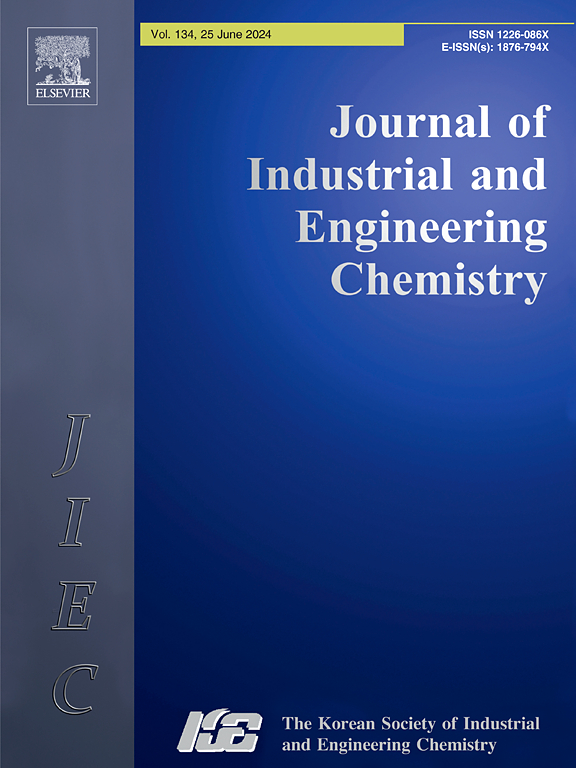Manganese-promoted sodium roasting and electric field-assisted leaching of vanadium slag for enhanced vanadium extraction
IF 5.9
3区 工程技术
Q1 CHEMISTRY, MULTIDISCIPLINARY
Journal of Industrial and Engineering Chemistry
Pub Date : 2025-04-13
DOI:10.1016/j.jiec.2025.04.027
引用次数: 0
Abstract
Vanadium slag (V-slag) is the primary raw material for vanadium extraction. Enhancing vanadium recovery and reducing roasting temperatures are key challenges. The conventional vanadium extraction process is characterized by high energy consumption and inefficient utilization of V-slag. This study proposes a manganese-promoted sodium roasting process (N-M roasting), followed by electric field-assisted leaching. The results of X-ray diffraction (XRD), X-ray photoelectron spectroscopy (XPS), scanning electron microscopy (SEM), and thermoanalysis demonstrate that the N-M roasting process effectively promotes the formation of vanadates. As a result, the roasting temperature was reduced to 973 K. The electric field-assisted leaching enhances the oxidation of low-valent vanadium at the anode. This dual process intensification of roasting and leaching increases the vanadium leaching rate to 94 %, representing an improvement of approximately 25 percentage points compared to the blank control. The new process significantly reduces energy consumption and improves vanadium recovery.
锰促进钠焙烧和电场辅助浸出钒渣强化提钒
钒渣(v渣)是提钒的主要原料。提高钒回收率和降低焙烧温度是关键的挑战。传统提钒工艺能耗高,钒渣利用率低。本研究提出锰促进钠焙烧工艺(N-M焙烧),然后电场辅助浸出。x射线衍射(XRD)、x射线光电子能谱(XPS)、扫描电镜(SEM)和热分析结果表明,N-M焙烧过程有效地促进了钒酸盐的形成。结果表明,焙烧温度降至973 K。电场辅助浸出提高了低价钒在阳极的氧化。焙烧和浸出的双重强化过程使钒浸出率提高到94%,与空白对照相比提高了约25个百分点。新工艺显著降低了能耗,提高了钒的回收率。
本文章由计算机程序翻译,如有差异,请以英文原文为准。
求助全文
约1分钟内获得全文
求助全文
来源期刊
CiteScore
10.40
自引率
6.60%
发文量
639
审稿时长
29 days
期刊介绍:
Journal of Industrial and Engineering Chemistry is published monthly in English by the Korean Society of Industrial and Engineering Chemistry. JIEC brings together multidisciplinary interests in one journal and is to disseminate information on all aspects of research and development in industrial and engineering chemistry. Contributions in the form of research articles, short communications, notes and reviews are considered for publication. The editors welcome original contributions that have not been and are not to be published elsewhere. Instruction to authors and a manuscript submissions form are printed at the end of each issue. Bulk reprints of individual articles can be ordered. This publication is partially supported by Korea Research Foundation and the Korean Federation of Science and Technology Societies.

 求助内容:
求助内容: 应助结果提醒方式:
应助结果提醒方式:


